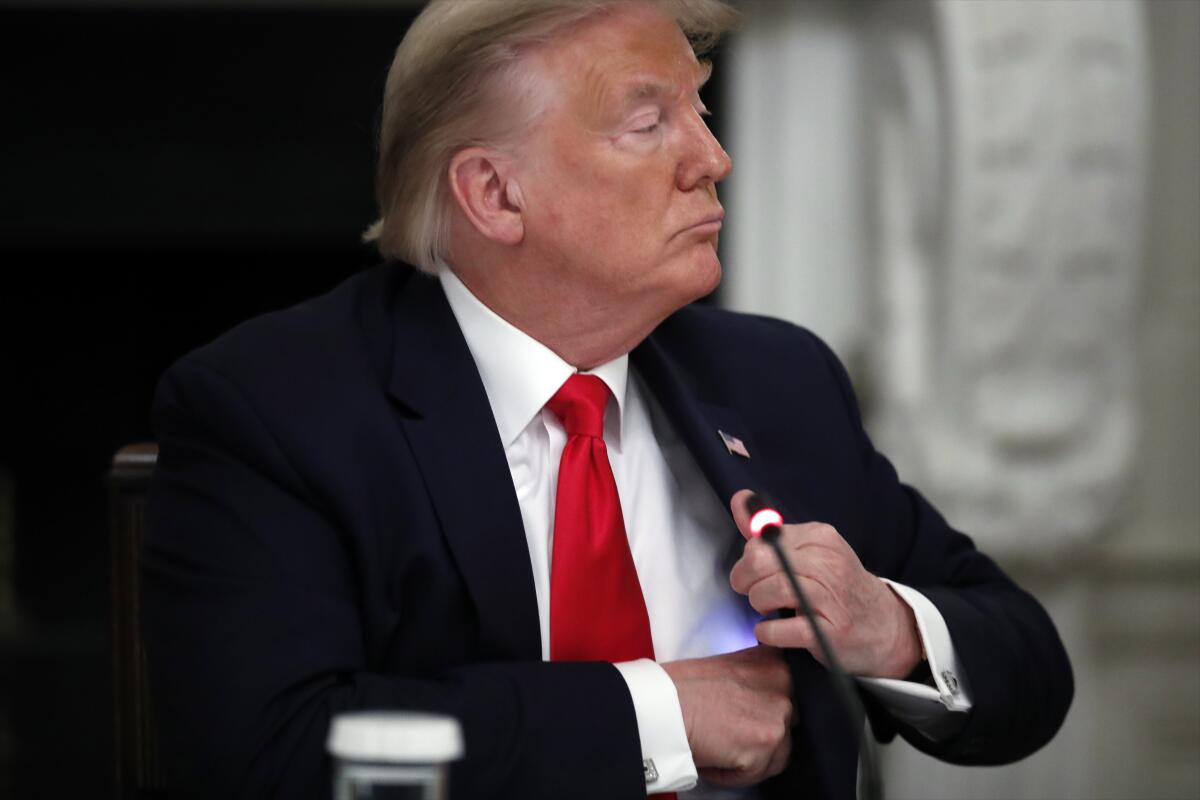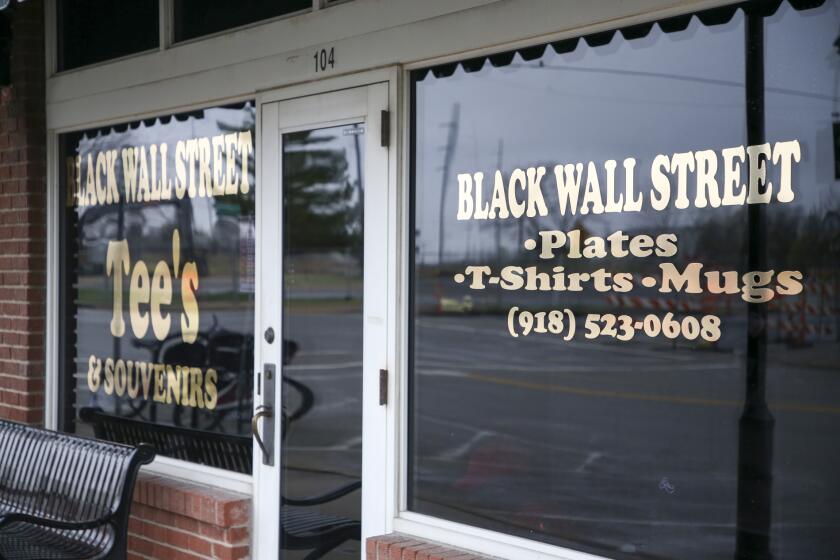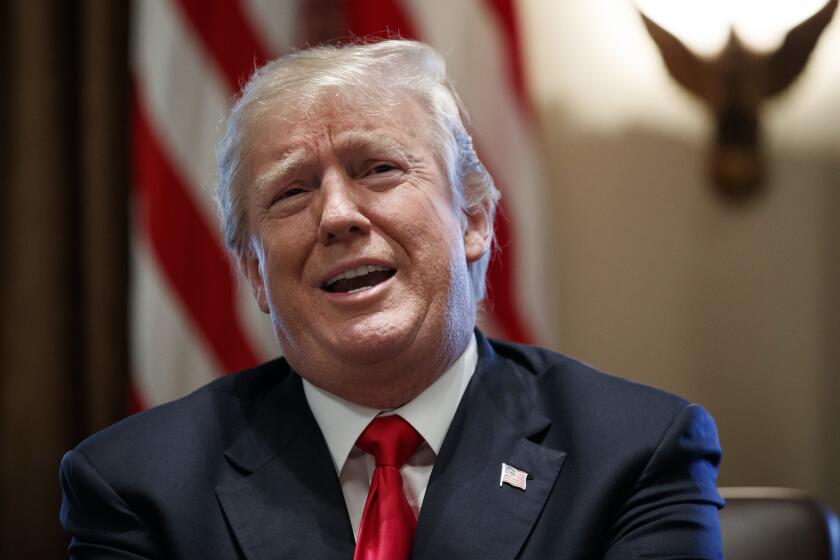Opinion: That Trump ad with Nazi imagery on Facebook? It proves conservatives wrong about content removal

- Share via
A day after the U.S. Department of Justice and a Republican senator called on Congress to make it harder for tech sites to remove content that violates their terms of service, Facebook removed a slew of content posted by President Trump’s campaign for violating its terms of service.
Specifically, Facebook on Thursday took down 88 Trump campaign ads calling on readers to “stand with President Trump against ANTIFA” and prominently featuring an upside-down red triangle — a symbol the Nazis had used to identify political prisoners. Campaign officials claimed that the triangle was an antifa symbol, but there’s no evidence of that (plus, similar ads had used stop and yield symbols).
For the record:
6:34 a.m. June 20, 2020An earlier version of this article identified Sen. Josh Hawley as a Republican from Nebraska. Hawley represents Missouri.
Whether by intention or not, the design lent support to the effort by Democrats to paint Trump as a white supremacist. “For the Trump campaign to use a symbol — one which is practically identical to that used by the Nazi regime to classify political prisoners in concentration camps — to attack his opponents is offensive and deeply troubling,” Jonathan Greenblatt, chief executive of the Anti-Defamation League, said in a statement to the Associated Press.
And then Twitter flagged one of the president’s tweets as “manipulated media” because it presented video including inflammatory footage purporting to be from CNN. The video — which argues that “fake news” is the problem, not racism in America — was from a parody account, but nothing in the video accurately labels it as such. In other words, it was exactly the sort of fakery Trump accuses CNN of doing, except his campaign really did it. (Twitter removed Trump’s tweet Friday after the owner of the original, undoctored video accused Trump of copyright infringement.)
If the president is trying to highlight the alleged problem the DOJ and Sen. Josh Hawley (R-Mo.) are eager to fix — the idea that tech sites discriminate against conservatives — he’s going about it in exactly the wrong way. Instead, he’s demonstrating why sites need to be able to take down content they find objectionable regardless of the political implications.
On top of the strong possibility that the Tulsa rally could spread coronavirus far and wide, violence might be in the offing.
The proposals by Hawley and the Justice Department focus on a 1996 law (known as Section 230 of the Communications Decency Act) that encourages websites to scrub offensive material posted by their users. Overturning a court ruling from the year before, Section 230 declares that websites aren’t liable for the material their users post, and it further shields them from liability if they remove suggestive, violent or “otherwise objectionable” content.
Hawley’s plan is straightfoward: He would let users sue if a tech company failed to honor its terms of service or enforced those terms unequally, with a minimum of $5,000 in damages plus attorney fees. So if, say, I posted a comment about Mexican immigrants on Snowflakes.com that the site took down for violating its rules against racist content, but the site did not take down other comments that I considered racist, I could sue the company for $5,000 to assuage my hurt feelings.
The DOJ’s proposal is more complicated, narrowing sites’ flexibility when removing material they find objectionable. Among other things, it would eliminate the “otherwise objectionable” category and replace it with “unlawful” and “promotes terrorism,” providing no clear liability shield for taking down racist, xenophobic or anti-Semitic material, hate speech or other content that now falls under the “otherwise objectionable” banner.
The Supreme Court’s ruling that the government botched how it sought to end DACA was a gift to President Trump’s campaign. And he’s turning it down.
John Bergmayer, legal director for Public Knowledge, an advocacy group for internet users, said the goal of both efforts is to limit sites’ discretion when it comes to removing user-generated content from their platforms. It’s fine to want these sites to be more transparent and do a better job explaining how they moderate users’ posts, Bergmayer said. But proposals like Hawley’s and the DOJ’s seem to envision sites creating objective standards that would somehow apply to every circumstance that comes up, and that’s silly, Bergmayer added.
For example, a site could have a policy against hate speech, but as the debate over “political correctness” demonstrates, defining what constitutes hate speech is a subjective judgment. Some conservatives even argue that there is no such thing as hate speech.
Eric Goldman, a law professor at Santa Clara University, notes that the DOJ’s proposal wouldn’t accomplish much of what it seeks to accomplish because it all but ignores the part of Section 230 that shields sites from liability for their users’ posts — a provision that the courts have interpreted to protect sites from liability when they remove users’ content too. That’s a sign, Goldman said, of how crude the department’s proposal is.
Berin Szoka of Tech Freedom, a nonpartisan tech think tank, noted a larger problem with the Section 230 proposals: They seek to force privately owned sites to carry speech that they don’t want to carry, in violation of their 1st Amendment rights. “What they’re really objecting to is the exercise of editorial discretion,” Szoka said.
Critics of Facebook, Twitter, YouTube and other dominant social networks argue that they have become so large, they are now the 21st century equivalent of the public square. But the courts don’t see things that way, Szoka said. The Supreme Court ruled almost exactly a year ago in Manhattan Community Access Corp. vs. Halleck that merely hosting someone else’s content on your privately owned site doesn’t make you a public forum.
You might think that more government regulation and lawsuits would be the last thing Republicans would suggest to solve a problem. Instead, you might expect them to call for better antitrust enforcement and other means to promote competition. In this instance, unfortunately, you would be wrong.
Trump’s proposal to regulate social media is unwise, but Congress should stop the social media companies from micro-targeting political ads without users’ permission.
More to Read
A cure for the common opinion
Get thought-provoking perspectives with our weekly newsletter.
You may occasionally receive promotional content from the Los Angeles Times.













